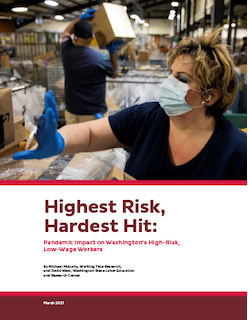LOCAL
Precarious essential workers hit hardest by pandemic: report
 SEATTLE (March 23, 2021) — A new report by the Washington State Labor Education and Research Center on the state’s precarious essential workers a year into this pandemic continues to spotlight the experiences and needs of Washington’s low-wage frontline workers as the pandemic unfolds.
SEATTLE (March 23, 2021) — A new report by the Washington State Labor Education and Research Center on the state’s precarious essential workers a year into this pandemic continues to spotlight the experiences and needs of Washington’s low-wage frontline workers as the pandemic unfolds.
“Highest Risk, Hardest Hit,” documents the high unemployment and financial challenges facing workers whose normally essential jobs were shut down to protect our communities. Meanwhile, other essential workers in high-risk and precarious occupations continued to work and struggled for workplace protections from COVID19 and its impacts. Co-authored by Labor Center Researcher David West and Michael Mulcahy of Working Title Research, the new report builds on their Fall 2020 study of frontline workers, “Essential, Precarious and At-Risk.” The earlier report captured the high safety risks and low wages facing nearly a million Washington workers at the outset of this crisis.
This follow-up report reveals that the economic shutdown during the pandemic drove workers in 14 of 26 high-risk, low-wage occupations to file for unemployment, food stamps, and emergency assistance at high rates. Those hardest hit include hospitality workers, personal care and services, vehicle operators, and managers in those fields. In addition to unemployment, the report documents the housing crisis now facing these workers as unpaid rent debts pile up.
At the same time, the pandemic boosted demand for health care, some retail, protective services, and other front-line occupations, where workers remained employed but many face continued COVID safety risks. COVID-related workers’ compensation claims jumped for health care, social assistance, public sector, and educational services. In addition, public health sources have documented outbreaks affecting health and long-term care, hospitality and service sectors, and grocery and other retail, agriculture, and food processing.
To protect workers, support hardest-hit families, and fully restore our economy, the report outlines needed policy actions, including stronger occupational health protections, a more flexible unemployment system, and expanded childcare services.
View the “Highest Risk, Hardest Hit” summary or full report.





